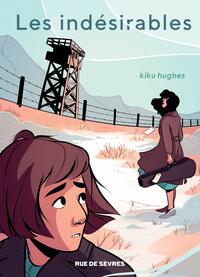Take a photo of a barcode or cover
adventurous
emotional
reflective
medium-paced
Plot or Character Driven:
A mix
Strong character development:
No
Loveable characters:
Complicated
Diverse cast of characters:
No
Flaws of characters a main focus:
Complicated
emotional
informative
inspiring
reflective
medium-paced
Plot or Character Driven:
A mix
Strong character development:
Yes
Loveable characters:
Yes
Diverse cast of characters:
Yes
Flaws of characters a main focus:
No
informative
reflective
fast-paced
Plot or Character Driven:
A mix
Strong character development:
Yes
Loveable characters:
Yes
Diverse cast of characters:
Yes
Flaws of characters a main focus:
No
dark
emotional
reflective
fast-paced
Kiku is minding her own business when she finds herself suddenly traveling back in time. She visits the 1940s and experiences the same internment camps that her grandmother was forced to live in. Time travel is involuntary here, just like internment. Kiku ends up living in a couple of different camps, getting involved with the internal politics and builds friendships with people there. Hughes tells the story in full color, using curved-edge panels and speech bubbles. Highly recommended for graphic novel collections serving teens in middle and high school.
emotional
informative
reflective
sad
Plot or Character Driven:
A mix
Diverse cast of characters:
Yes
dark
informative
inspiring
sad
tense
fast-paced
Plot or Character Driven:
A mix
Strong character development:
Yes
Loveable characters:
Yes
Diverse cast of characters:
Yes
Flaws of characters a main focus:
No
informative
reflective
fast-paced
Plot or Character Driven:
Character
Strong character development:
Yes
Loveable characters:
Yes
Diverse cast of characters:
Yes
I could see this being used in my 4th grade classroom alongside Maus. As for my personal enjoyment, I found it was intended for too young of an audience for me to enjoy fully at 23 years old. However, for the intended age group it is good.
(Read this with an eye for whether or not it could be a whole-class text)
Displacement is an important text and I am glad that it exists in the world. Kiku Hughes follows in Octavia Butler's footsteps using thee idea of getting pulled back in time in order to explore her grandmother's experience with Japanese Incarceration camps. She also makes modern day references & explicit connection to the muslim ban & anti immigrant rhetoric.
Appreciations & Strengths for teaching: Thematically strong & interesting(displacement, storytelling), shows an important moment in history in an accessible story, could definitely be a book club choice for how do authors use fantasy/sci-fi to talk about difficult subjects and inhumane history...
Models resistance, and the difficult choices about how & when to resist, and when people might not out of safety. Also discussion of language. Intergenerational trauma.
Weakness: The first have of the book is so good! But then in the second half, Hughes sort of stops crafting a narrative, and it switches much more to direct telling about Ernesta's life, and Hughes' mom' experience. The text explicitly teaches/tells instead of allowing readers to learn through narrative. It is such a bummer that this wasn't revised and edited so that the actual narrative was continued. I think some explicit teaching is indeed necessary--especially for the targeted age group--but it just never returns to story.
Other considerations: Trump is portrayed in the present-day sections of the book. He is rightfully shown to be pushing anti immigrant policies, but this is something to consider especially if teaching in a different district than where I currently teach. Would ned a plan for discussion.
Also: Loved the nod to queer love with Kiku & May :)
Displacement is an important text and I am glad that it exists in the world. Kiku Hughes follows in Octavia Butler's footsteps using thee idea of getting pulled back in time in order to explore her grandmother's experience with Japanese Incarceration camps. She also makes modern day references & explicit connection to the muslim ban & anti immigrant rhetoric.
Appreciations & Strengths for teaching: Thematically strong & interesting(displacement, storytelling), shows an important moment in history in an accessible story, could definitely be a book club choice for how do authors use fantasy/sci-fi to talk about difficult subjects and inhumane history...
Models resistance, and the difficult choices about how & when to resist, and when people might not out of safety. Also discussion of language. Intergenerational trauma.
Weakness: The first have of the book is so good! But then in the second half, Hughes sort of stops crafting a narrative, and it switches much more to direct telling about Ernesta's life, and Hughes' mom' experience. The text explicitly teaches/tells instead of allowing readers to learn through narrative. It is such a bummer that this wasn't revised and edited so that the actual narrative was continued. I think some explicit teaching is indeed necessary--especially for the targeted age group--but it just never returns to story.
Other considerations: Trump is portrayed in the present-day sections of the book. He is rightfully shown to be pushing anti immigrant policies, but this is something to consider especially if teaching in a different district than where I currently teach. Would ned a plan for discussion.
Also: Loved the nod to queer love with Kiku & May :)






